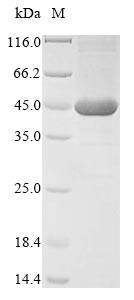Recombinant Neisseria meningitidis serogroup C / serotype 2a Quinolinate synthase A (nadA) is produced in E. coli and includes a full-length sequence from 1-370 amino acids. This protein features an N-terminal 6xHis-tag, which makes purification and detection more straightforward. The product demonstrates a purity level greater than 85% as confirmed by SDS-PAGE analysis, ensuring suitability for various research applications.
Quinolinate synthase A (nadA) appears to play a critical role in the biosynthesis of quinolinic acid, a key precursor in the NAD+ biosynthesis pathway. This enzyme is essential for the production of nicotinamide adenine dinucleotide, a crucial cofactor involved in numerous metabolic processes. Understanding its function and activity may be important for studying bacterial metabolism and potential therapeutic targets.
Potential Applications
Note: The applications listed below are based on what we know about this protein's biological functions, published research, and experience from experts in the field. However, we haven't fully tested all of these applications ourselves yet. We'd recommend running some preliminary tests first to make sure they work for your specific research goals.
Neisseria meningitidis Quinolinate synthase A (NadA) is a bacterial enzyme involved in NAD biosynthesis that requires precise folding, proper active site formation, and specific oligomerization (typically homodimeric or homotetrameric structure) for its functional activity. The E. coli expression system is homologous to this bacterial protein, which significantly increases the probability of correct folding and oligomerization. The N-terminal 6xHis-tag is relatively small and may cause minimal steric interference. While the full-length protein (1-370aa) contains all functional domains, the probability of correct folding with functional enzymatic activity requires experimental validation of oligomerization and catalytic activity.
1. Biochemical Characterization of NAD Biosynthesis Pathway
This application carries a moderate risk without functional validation. NadA enzymatic activity requires precise oligomerization and proper active site formation. If correctly folded and active (verified through enzymatic assays), the protein is highly suitable for kinetic studies. If misfolded/inactive (unverified), kinetic measurements will yield biologically meaningless results.
2. Antibody Development and Immunological Studies
This application is highly suitable as antibody development relies on antigenic sequence recognition rather than functional enzymatic activity. The full-length protein provides comprehensive epitope coverage for generating NadA-specific antibodies. The high purity (>85%) ensures minimal contamination-related issues during immunization protocols.
3. Protein-Protein Interaction Studies
This application requires proper folding and oligomerization validation. NadA interactions with metabolic partners require native oligomeric structure. If correctly folded (verified), the protein may identify physiological interaction partners. If misfolded/unverified, there is a risk of non-specific binding or failure to replicate genuine metabolic complex formation.
4. Structural Biology and Biophysical Analysis
These studies are essential for determining folding status. Techniques should include size-exclusion chromatography to assess oligomeric state, circular dichroism spectroscopy to evaluate secondary structure, and thermal shift assays to determine stability. The homologous expression system strongly supports proper folding.
5. Drug Target Validation and Inhibitor Screening
This application carries a significant risk without functional validation. Inhibitor screening requires native enzyme conformation and catalytic activity. If correctly folded and active (verified), the protein is suitable for screening studies. If misfolded/inactive (unverified), screening results will be unreliable for drug discovery.
Final Recommendation & Action Plan
The E. coli expression system is highly favorable for producing this homologous bacterial NadA enzyme, as it provides the native folding environment necessary for proper structure and function. Begin with Application 4 (Structural Characterization) to assess folding quality through SEC (oligomerization analysis), CD spectroscopy, and validate enzymatic activity using standard quinolinate synthase assays. Once functionality is verified, Applications 1, 3, and 5 can proceed with confidence. Application 2 (antibody development) can proceed immediately. The small His-tag is unlikely to significantly interfere with function. This recombinant NadA represents an excellent tool for studying bacterial NAD biosynthesis when properly validated.




